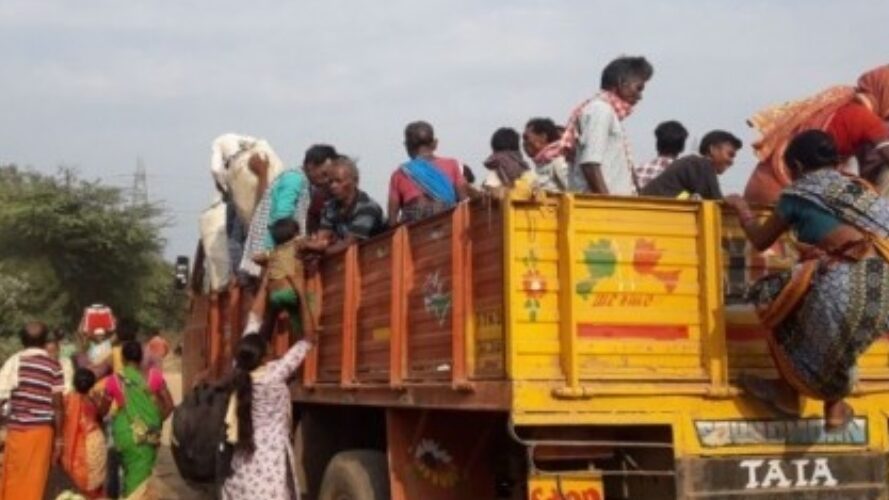Local Officials Go Above and Beyond to Free 147 from Slavery at a Brick Kiln
Slavery
Last week, nearly 150 children, women and men were rescued from bonded labor slavery in a single Indian brick kiln, thanks to the diligent work of local government officials, police and IJM staff.
Three suspects accused of enslaving these families have been apprehended by police, with one already charged under India’s anti-trafficking laws, and the rescued slaves are now safely back in their home villages.
The quick arrests and a faithful commitment to the survivors’ wellbeing through this operation demonstrates a promising shift in local government attitudes in this area—and a much stronger response to the plague of bonded labor slavery still alive across the country.
Learning about Life in Slavery
The intense, four-day operation began on Wednesday, March 14, when IJM brought the case to the local government’s attention. Impoverished families had been misled and trafficked from several central Indian states and were being forced to make thousands of clay bricks each day in appalling conditions. Authorities were moved to action by the stories and quickly mobilized to intervene.
The team arrived on Wednesday to find the victims working across the massive facility, but rescuing them was not an easy feat.
As they interviewed laborers, local officials gathered a complicated picture of life in the brick kiln and were unsure at first that this case was actually bonded labor slavery. Often, victims have trouble speaking up about their experience due to fear or intimidation, and it can be hard for officials to ascertain the truth.
Fortunately, one 13-year-old boy stepped up at just the right time to clearly explain how he was made to work 9 hours every day, tallying bricks as they went into the kiln. His courage then emboldened others.
Teenage girls described carrying heavy stacks of 10 bricks at a time on their heads. A single mother shared the agony of not being able to get medical care for her sick child. Soon the local authorities had enough information to complete the rescue operation and bring the victims to safety.
As the families rested and recovered at a local marriage hall—a huge facility rented by the government to keep them safe—more stories of abuse and deprivation emerged. Many laborers said they endured verbal abuse and physical beatings for months or years under the slave owner’s control.
Children told IJM staff they hadn’t been able to play in the kiln because of their strict schedule and the pain in their arms and legs from carrying bricks all day. Their families were made to work from 4:00 am to 11:00 am, before snatching a few hours to rest before working again until dark. Many children said they couldn’t remember playing a single day in the kiln.
One grandmother explained the everyday struggles of life in the kiln, even as simple as getting a good meal: “[We have] no proper food in our stomachs. How can we be happy then? If we’re sick, we can’t work and don’t get paid. Kaam nahi, khana nahi [no work, no food].”
She then grinned and described all she’d do back at home, “We’ll go back and eat rice, roti, daal and so much more! We’ll have a bath in clean water!”
Getting Survivors What They Need
Once the laborers were all safe and their stories had been recorded, government officials helped process their official release certificates—which break any false debts to the slave owner and mark the survivors as free. In total, 111 adults received these crucial documents.
Next, the Revenue Division Officer—the government leader in charge of the rescue operation—arranged warm meals and urgent medical care for the survivors, including vaccinations and tetanus shots for children. She also arranged new ID cards for each person and brought in a local bank to set up accounts for each family so they could receive government funding for their rehabilitation. Authorities worked long hours over the next several days to ensure each family was cared for well and prepared for life in freedom.
Meanwhile, the police sent out a special task force to find the brick kiln owner and several of his accomplices, who had absconded to a neighboring state. They found the accused the next day and took the kiln owner into judicial custody. This was above and beyond normal policing, and a huge mark of change in proactivity and a deeper understanding of these crimes.
In her statements to media, the high-ranking District Collector affirmed that this area has a high prevalence of bonded labor and announced plans for impromptu checks at local businesses to ensure no abuse was taking place. She also plans to educate business owners on how to hire ethically.
Then, in a speech to the survivors, the Collector encouraged families to use a toll-free hotline if they faced any trouble or felt at risk, and promised to send government officials with them on the 24-hour train journey back to their home state. She assured them she’d work with their home state on their ongoing rehabilitation and wished them well on their life in freedom.
From there, IJM and the government officials helped the survivors gather their belongings and head to the train station to return home. Officials provided water bottles for the journey and even held up the train for 20 minutes to ensure all the survivors were safely on board. Many will join IJM’s two-year aftercare program for rescued slaves to re-learn life skills and how to stay safe in the future.